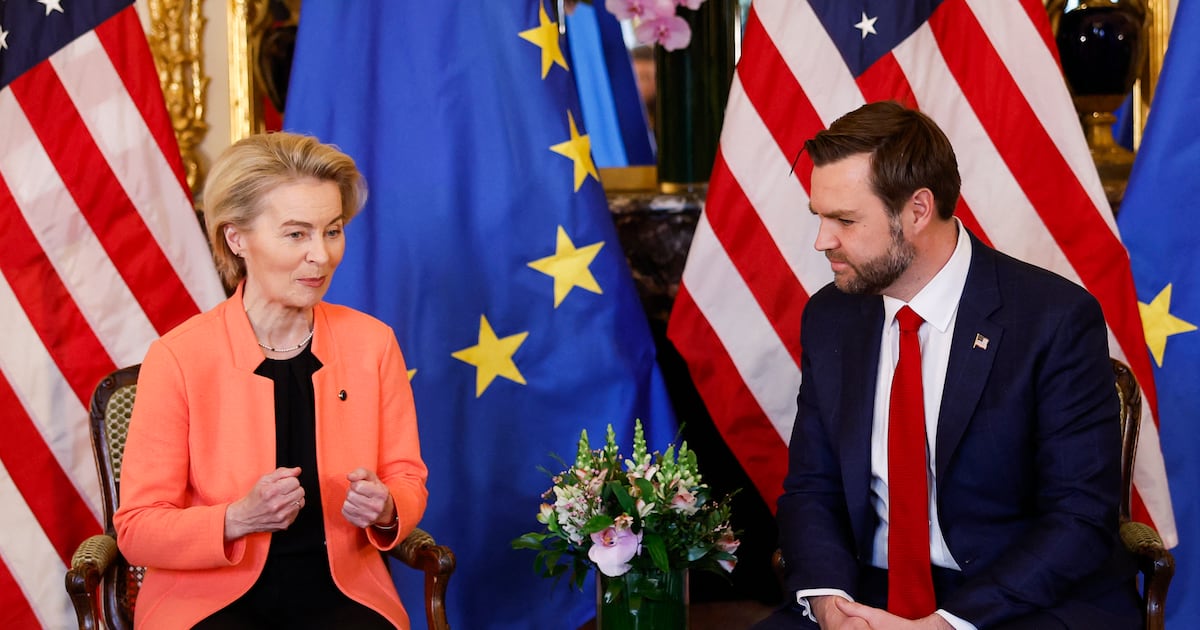Suzerains or vassals? Judaeo-Christians or secularists? Censors or regulators? Post-liberals of right or left? Sovereign or liberal internationalists?
Where power lies across the Atlantic is highlighted by the US-Russian and US-European summitry on Ukraine and trade – and these rhetorical polarities from their antagonistic discourse reveal the deep ideological and material interests now at play in their wider confrontations.
Europe’s military dependency on the United States is starkly revealed in what should be the (inevitably messy) endgame of the Ukraine war. Taking full advantage of that power, Donald Trump convened the Alaska summit with Vladimir Putin on a basis of sovereign equality. He then consulted the Europeans at the White House on the security guarantees, ceasefires and territorial compromises needed to end the fighting.
Trump remains the prime mover of the process, but is open to bargaining these terms in coming weeks. His endgame is to preserve superior US power across the Atlantic whatever the outcome – and that is plainly related to the other dimensions of US power involved in these confrontations.
The lopsided trade deal reached in Scotland between Trump and the European Commission president, Ursula von der Leyen, imposed a 15 per cent tariff on EU goods for none the other way, plus EU vows to purchase US arms and energy. Geopolitical considerations, and especially the need to preserve Nato security guarantees in Europe, underlay her relatively weak deal. Critics say it conceded too much to Trump’s bullying tactics. A more resolute retaliation like China’s against US service exports and access to EU markets would have better protected European interests.
[ JD Vance hasn’t mastered the art of the political holidayOpens in new window ]
The intensity and coherence of the Trump administration’s animus against the EU’s world views are revealed in recent statements by its advocates and theorists. A number of them centre on vice-president JD Vance in his role as a serious and ambitious political networker of radical right-wing conservatism in Europe.
In a recent post on Substack on “The Need for Civilisational Allies in Europe” Marco Rubio’s State Department argues for a return of Roman and Judaeo-Christian values to steer western civilisation away from the European multiculturalism and secularism that betray it. Alliance realignment, conditional aid and visa bans are needed to confront liberal European enemies of the Trump administration’s new values: imperial strength, tradition, faith and hierarchical order.
The themes draw on a speech given by Trump in Poland in 2017 celebrating its conservatism and another by Vance in Munich earlier this year in which he berated European ideological censorship of far-right and Christian fundamentalist activists.
They are further taken up in a Daily Telegraph article this week by three members of the congressional judiciary committee. They say EU and European laws regulating content and hate speech of high tech and other companies undermine and penalise US online free speech. “While Europe struggles with a surging migrant crisis and a stagnant economy, it looks to American companies to bail it out. Instead of fixing these problems, Europe’s leaders revert to censoring critics of their failing policies.”
[ JD Vance gets brief Easter audience with Pope Francis in VaticanOpens in new window ]
On a more philosophical plane Patrick Deneen, the Irish-American professor of political theory in Notre Dame university has become one of Vance’s most influential Catholic advisers. His 2023 book Regime Change: Towards a Postliberal Future, advocates the restoration of religious, cultural and family values to replace liberalism’s protection of individual rights and freedoms through a value-neutral proceduralism.
Regime change is required through “the peaceful but vigorous overthrow of a corrupt and corrupting liberal ruling class in which existing political forms can remain in place, as long as a fundamentally different ethos informs those institutions and the personnel who populate key offices and positions”.
Quoting him in the Jesuit review Studies, its editor Dermot Roantree critically examines these Catholic intellectuals advising Vance. He shows how Vance combines such approaches with a darker influence from the German legal theorist Carl Schmitt, who justified Hitler’s seizure of dictatorial power in 1933-34 in the name of state supremacy. Trump’s sovereigntist logic similarly justifies state power, he argues. Deneen admires the Hungarian leader Viktor Orban and in a recent interview there said Trump had made a strong start towards such regime change in his first six months.
European leaders responding to Trump need to stiffen their resolve if they want to resist his reactionary politics and effectively defend their own liberal internationalist regime. They are ill-equipped to do so given their own irresolution and right-wing drift. Collectively they equal US economic strength and are 10 times stronger than Russia’s but they cannot match their political and military cohesion or current authoritarianism.
To renew such a degenerative West they should actively pursue beneficial alliances with other world regions and states with which they share interdependent and multilateral values in a more multipolar setting. Otherwise they risk becoming vassals of Trump’s proffered suzerainty.
